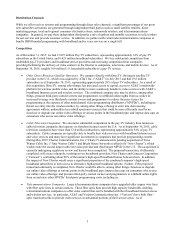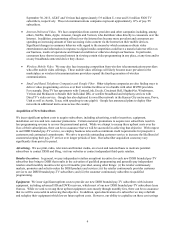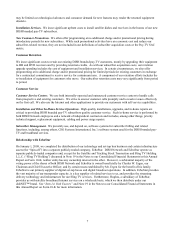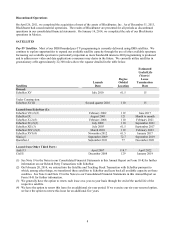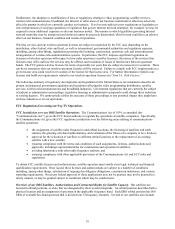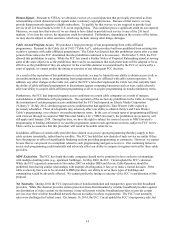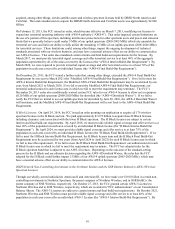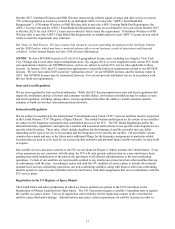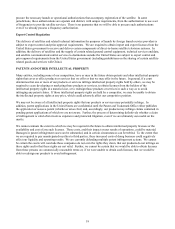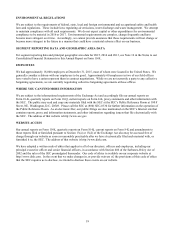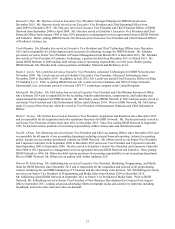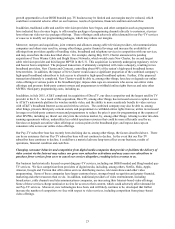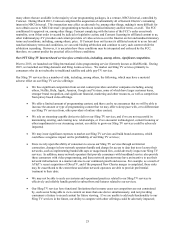Dish Network 2015 Annual Report Download - page 25
Download and view the complete annual report
Please find page 25 of the 2015 Dish Network annual report below. You can navigate through the pages in the report by either clicking on the pages listed below, or by using the keyword search tool below to find specific information within the annual report.15
vacated both the nondiscrimination and anti-blocking rules. On February 26, 2015, the FCC revised its net neutrality
rules, relying primarily upon Title II of the Communications Act and Section 706 of the Telecommunications Act of
1996. The new rules became effective on June 12, 2015. They apply to both fixed and mobile broadband service and
generally prohibit discrimination, blocking, throttling, and paid prioritization. These new rules have been challenged and
appealed to the D.C. Circuit. We cannot predict the timing or outcome of this appeal or of any subsequent challenges to
the rules. Therefore, we cannot predict the practical effect of these rules and related proceedings on our ability to
distribute our video content via the Internet.
Comcast-NBCUniversal. In January 2011, the FCC and the Department of Justice approved a transaction between
Comcast and General Electric Company (“General Electric”), pursuant to which they joined their programming
properties, including NBC, Bravo and many others, in a venture, NBCUniversal, controlled by Comcast. During
March 2013, Comcast completed the acquisition of substantially all of General Electric’s remaining interest in
NBCUniversal. The FCC conditioned its approval on, among other things, Comcast complying with the terms of the
FCC’s order on network neutrality (even if that order is vacated by judicial or legislative action) and Comcast licensing
its affiliated content to us, other traditional pay-TV providers and certain providers of video services over the Internet on
fair and nondiscriminatory terms and conditions, including, among others, price. If Comcast does not license its
affiliated content to us on fair and nondiscriminatory terms and conditions, we can seek binding arbitration and continue
to carry such content while the arbitration is pending. However, it is uncertain how these conditions may be interpreted
and enforced by the FCC; therefore, we cannot predict the practical effect of these conditions. In addition, as these
conditions expire in January 2018, we will not be able to rely on these protections beyond that date.
Definition of MVPD. In December 2014, the FCC issued a Notice of Proposed Rulemaking regarding the definition of
an MVPD. Among other things, the FCC is considering whether the definition of an MVPD should apply to Internet-
based streaming services, thus making such services subject to the same regulations as an MVPD. The FCC is also
considering the appropriate treatment of purely Internet-based linear video programming services that cable operators
and DBS providers offer in addition to their traditional video services. We cannot predict the timing or outcome of this
rulemaking process.
FCC Regulation of Wireless Spectrum
DISH Network Spectrum
700 MHz Licenses. In 2008, we paid $712 million to acquire certain 700 MHz E Block (“700 MHz”) wireless spectrum
licenses, which were granted to us by the FCC in February 2009. At the time they were granted, these licenses were
subject to certain interim and final build-out requirements. On October 29, 2013, the FCC issued an order approving a
voluntary industry solution to resolve certain interoperability issues affecting the lower 700 MHz spectrum band (the
“Interoperability Solution Order”), which requires us to reduce power emissions on our 700 MHz licenses. As part of
the Interoperability Solution Order, the FCC, among other things, approved our request to modify the original interim
and final build-out requirements associated with our 700 MHz licenses so that by March 2017, we must provide signal
coverage and offer service to at least 40% of our total E Block population (the “Modified 700 MHz Interim Build-Out
Requirement”). The FCC also approved our request to modify the 700 MHz Final Build-Out Requirement so that by
March 2021, we must provide signal coverage and offer service to at least 70% of the population in each of our E Block
license areas (the “Modified 700 MHz Final Build-Out Requirement”). While the modifications to our 700 MHz
licenses provide us additional time to complete the build-out requirements, the reduction in power emissions could have
an adverse impact on our ability to fully utilize our 700 MHz licenses. If we fail to meet the Modified 700 MHz Interim
Build-Out Requirement, the Modified 700 MHz Final Build-Out Requirement may be accelerated by one year, from
March 2021 to March 2020, and we could face the reduction of license area(s). If we fail to meet the Modified 700 MHz
Final Build-Out Requirement, our authorization may terminate for the geographic portion of each license in which we
are not providing service.
AWS-4 Licenses. On March 2, 2012, the FCC approved the transfer of 40 MHz of wireless spectrum licenses held by
DBSD North America, Inc. (“DBSD North America”) and TerreStar Networks, Inc. (“TerreStar”) to us. On March 9,
2012, we completed the acquisition of 100% of the equity of reorganized DBSD North America (the “DBSD
Transaction”) and substantially all of the assets of TerreStar (the “TerreStar Transaction”), pursuant to which we


